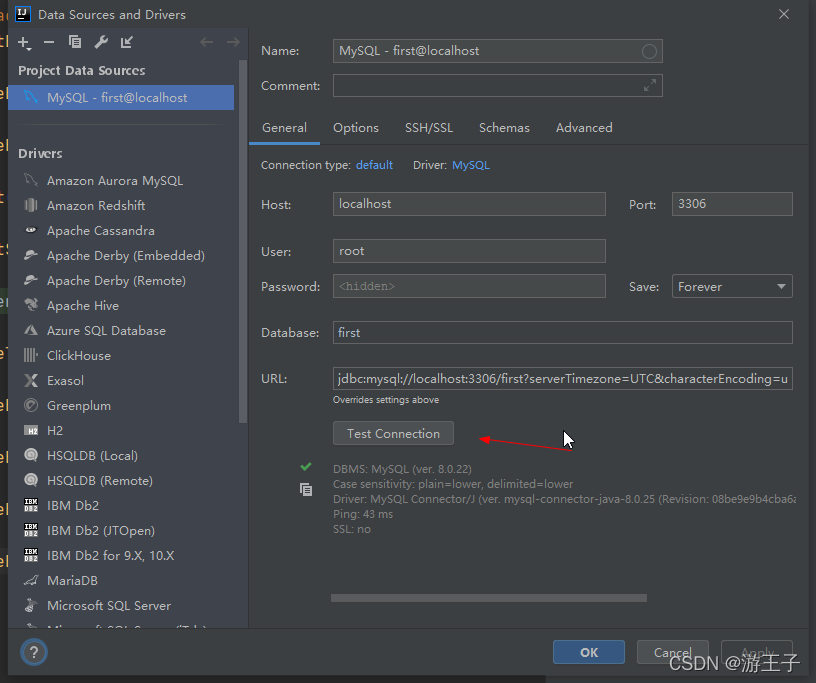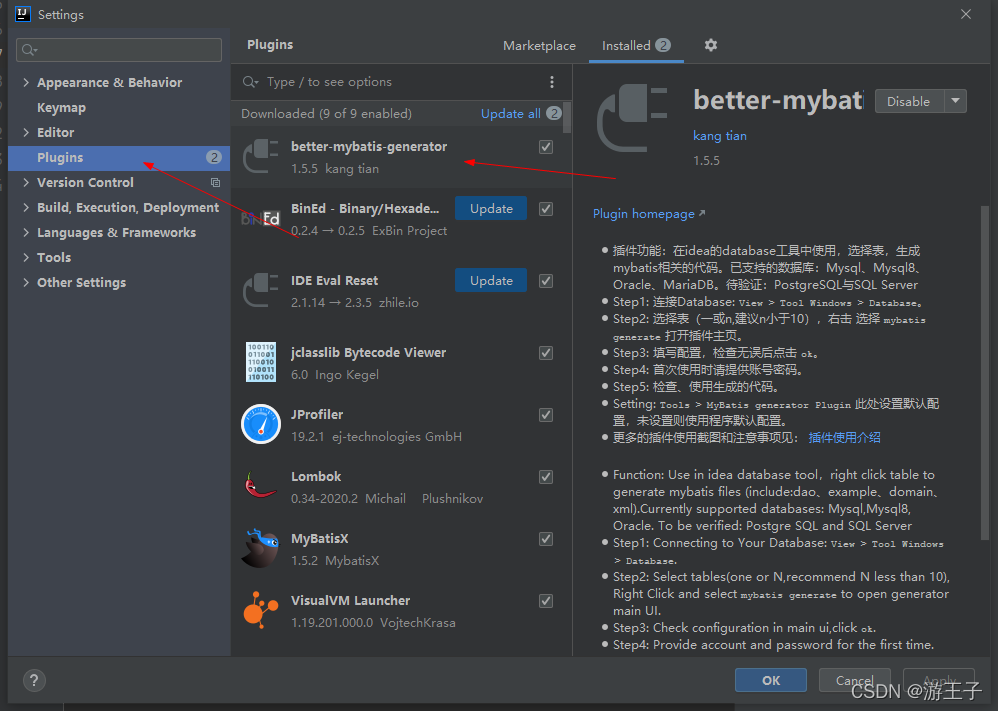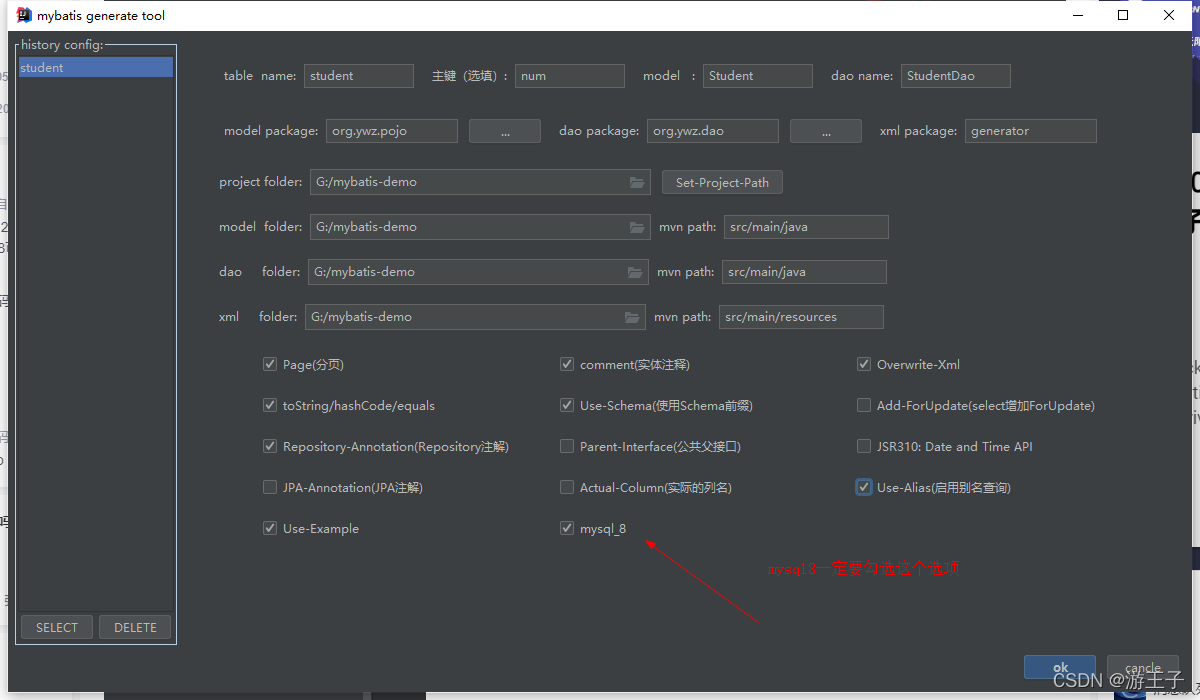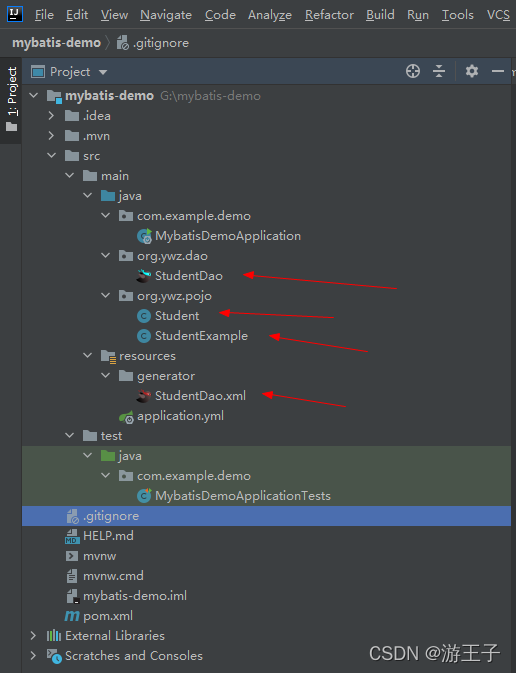您好,登录后才能下订单哦!
密码登录
登录注册
点击 登录注册 即表示同意《亿速云用户服务条款》
idea怎么使用Mybatis逆向工程插件,很多新手对此不是很清楚,为了帮助大家解决这个难题,下面小编将为大家详细讲解,有这方面需求的人可以来学习下,希望你能有所收获。

添加连接的mysql的信息,测试链接成功即可。


安装成功后,在需要生成的表上右键选择mybatis-generator。

添加要生成的一些配置。

点击OK,第一次生成会弹出窗口,需要输入数据库的帐号密码。可以看到生成该表对应的mapper接口、实体类和sql。

mybatis-generator会为每个字段产生Criterion,为底层的mapper.xml创建动态sql。如果表的字段比较多,产生的example类会十分庞大。理论上通过example类可以构造你想到的任何筛选条件。
//作用:升序还是降序
//参数格式:字段+空格+asc(desc)
protected String orderByClause;
//作用:去除重复
//true是选择不重复记录,false,反之
protected boolean distinct;
//自定义查询条件
//Criteria的集合,集合中对象是由or连接
protected List<Criteria> oredCriteria;
// 分页的显示条数
private Integer limit;
// 分页的起始下标
private Long offset;
//内部类Criteria包含一个Cretiron的集合,
//每一个Criteria对象内包含的Cretiron之间是由 AND连接的
public static class Criteria extends GeneratedCriteria {
protected Criteria() {super();}
}
//是mybatis中逆向工程中的代码模型
protected abstract static class GeneratedCriteria {......}
//是最基本,最底层的Where条件,用于字段级的筛选
public static class Criterion {......}在MybatisDemoApplicationTests类中进行测试:
package org.ywz.test;
import org.junit.jupiter.api.Test;
import org.junit.platform.commons.util.StringUtils;
import org.springframework.beans.factory.annotation.Autowired;
import org.springframework.boot.test.context.SpringBootTest;
import org.ywz.dao.StudentDao;
import org.ywz.pojo.Student;
import org.ywz.pojo.StudentExample;
import java.util.List;
/**
* Example类使用说明
*/
@SpringBootTest
class MybatisDemoApplicationTests {
@Autowired
private StudentDao studentDao;
@Test
void contextLoads() {
StudentExample studentExample = new StudentExample();
// 查询数据的总条数 类似于:select count(*) from student
long l = studentDao.countByExample(studentExample);
System.out.println("---------------总条数----------------");
System.out.println("数据库的总条数:" + l);
System.out.println("----------------and条件---------------");
// where条件查询或多条件查询
Student student = new Student();
student.setName("王五");
student.setSex("男");
selectAndCondition(student);
System.out.println("---------------or条件----------------");
selectOrCondition(student);
System.out.println("-----------------模糊查询--------------");
student.setName("王");
selectLikeCondition(student);
System.out.println("-----------------分页查询--------------");
selectLimit();
}
/**
* where条件查询或多条件查询
* 类似于:select * from student where name={#student.name} and sex={#student.sex} order by score asc;
*
* @param student
*/
private void selectAndCondition(Student student) {
StudentExample studentExample = new StudentExample();
StudentExample.Criteria criteria = studentExample.createCriteria();
studentExample.setOrderByClause("score asc"); //升序
studentExample.setDistinct(false); //不去重
if (StringUtils.isNotBlank(student.getName())) {
criteria.andNameEqualTo(student.getName());
}
if (StringUtils.isNotBlank(student.getSex())) {
criteria.andSexEqualTo(student.getSex());
}
List<Student> students = studentDao.selectByExample(studentExample);
students.forEach(System.out::println);
}
/**
* 类似于:select * from student where name={#student.name} or sex={#student.sex} ;
*
* @param student
*/
private void selectOrCondition(Student student) {
StudentExample studentExample = new StudentExample();
StudentExample.Criteria criteria1 = studentExample.createCriteria();
StudentExample.Criteria criteria2 = studentExample.createCriteria();
if (StringUtils.isNotBlank(student.getName())) {
criteria1.andNameEqualTo(student.getName());
}
if (StringUtils.isNotBlank(student.getSex())) {
criteria2.andSexEqualTo(student.getSex());
}
studentExample.or(criteria2);
List<Student> students = studentDao.selectByExample(studentExample);
students.forEach(System.out::println);
}
/**
* 类似于:select * from student where name like %{#student.name}%
*
* @param student
*/
private void selectLikeCondition(Student student) {
StudentExample studentExample = new StudentExample();
StudentExample.Criteria criteria = studentExample.createCriteria();
if (StringUtils.isNotBlank(student.getName())) {
criteria.andNameLike("%" + student.getName() + "%");
}
List<Student> students = studentDao.selectByExample(studentExample);
students.forEach(System.out::println);
}
/**
* 类似于:select * from student limit offset,limit
*/
public void selectLimit() {
StudentExample studentExample = new StudentExample();
studentExample.setOffset(2l);
studentExample.setLimit(5);
List<Student> students = studentDao.selectByExample(studentExample);
students.forEach(System.out::println);
}
}运行结果:

看完上述内容是否对您有帮助呢?如果还想对相关知识有进一步的了解或阅读更多相关文章,请关注亿速云行业资讯频道,感谢您对亿速云的支持。
免责声明:本站发布的内容(图片、视频和文字)以原创、转载和分享为主,文章观点不代表本网站立场,如果涉及侵权请联系站长邮箱:is@yisu.com进行举报,并提供相关证据,一经查实,将立刻删除涉嫌侵权内容。